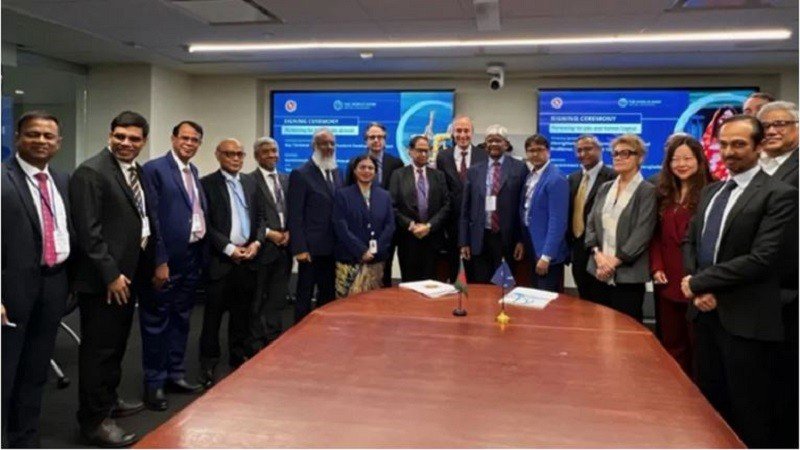Bangladesh, WB sign $850m deals to boost trade, create jobs
Published: 24 April 2025, 6:57:38

Bangladesh and World Bank have signed two financing agreements of $850 million to help the country develop the Bay Terminal deep sea port and modernise the national social protection system to accelerate job creation and inclusive growth.
Two separate financing agreements were signed on Wednesday in Washington DC between the Economic Relations Division (ERD) of Bangladesh and the International Development Association (IDA), the World Bank’s concessional arm. Shahriar Siddiky and Dr. Gayle Martin on behalf of Bangladesh and the World Bank signed the agreements respectively.
Finance Adviser Dr Salehuddin Ahmed and World Bank Vice President for South Asia Martin Raiser were also present at the signing ceremony.
The financing is from the World Bank’s International Development Association (IDA).
The Bay Terminal Marine Infrastructure Development Project ($650 million) will enhance Bangladesh’s export competitiveness by increasing port’s capacity and efficiency and reducing transportation costs and time.
It will support essential infrastructure for port development, including a six-km climate-resilient breakwater and access channels.
By accommodating larger vessels, the deep sea port will substantially decrease vessel turnaround time, potentially saving the economy about $1 million daily.
Govt urged to move to defer the country’s graduation from LDC as it lacks readiness
The Bay Terminal will handle about 36 percent of Bangladesh’s container volumes, directly benefiting over one million people by improving access to sustainable transport services and enhancing connectivity to regional and international markets.
The project will also facilitate women-owned enterprises to explore trade opportunities and women’s employment in port operations.
The Strengthening Social Protection for Improved Resilience, Inclusion, and Targeting (SSPIRIT) project ($200 million) will provide cash transfers and livelihood services for 4.5 million people, focusing on youths, persons with disabilities, women and workers in climate-vulnerable regions.
The project will modernize delivery systems, ensuring support reaches those most in need and enabling effective responses to potential climate or economic shocks.
It will establish a national Dynamic Social Registry for accurate targeting of beneficiaries and for identifying individuals eligible for further support, such as livelihoods and employment services.
By combining cash assistance with skills development and entrepreneurship, micro-credit and mentorship, the project will improve job readiness and income earning capacities of about 2.5 million people. Such a graduation strategy that allows poor households—with a focus on youth and women—to ‘move up the ladder’ is vital for Bangladesh’s labor market.
Shahriar Siddiky, Secretary, Economic Relations Division (ERD), said that Bangladesh and the World Bank have a strong and longstanding partnership to help the country achieve inclusive growth and its development aspirations.
“These projects will be critical for the country’s climate resilience and a prosperous future,” he said.
Gayle Martin, World Bank Interim Country Director for Bangladesh, said that To remain on a sustainable growth path, Bangladesh must create quality jobs for its population, particularly for the nearly 2 million youth who enter the labour market every year.
“This financing package will be a game changer for job creation by enhancing trade and export competitiveness and helping the most vulnerable graduate from social protection programs and get ready for the job market,” he said.





